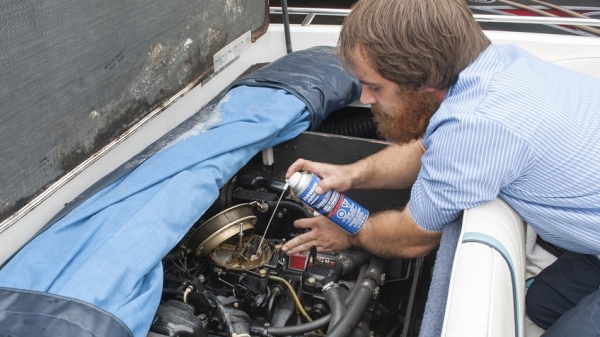-
Try to get the boat out of the water altogether. While it takes more effort and money to bring your boat ashore, storing it on land can protect it from high winds, freezing rains and ice damage. Storage ashore also may prevent blisters from forming on a hull because it gets a chance to dry out.
-
If you can afford a temperature controlled and covered storage area, go for it. If you can’t, there’s other alternatives. You can safely store your boat ashore yourself, but take care that you know how your boat is laid up. A boat that is stored on land assumes it will be resting on something that provides solid support, hopefully a trailer that is built for the job.
-
If a trailer isn’t practical, see if your boat’s manufacturer or yard manager has some tips. Manufacturers sometimes offer a plan that indicates where blocks and jack stands should be placed support for your boat, or ask your yard manager for assistance. Hulls without proper support can become distorted. Jack stands may need to be connected with safety chains so they won’t slip from underneath the boat.
-
Cover the boat with something that will hold up to the elements. Make sure your cover is designed to handle the extra weight of snow build-up if it’s stored outside. You'll need a snug fit to keep unwanted visitors, like rodents, off the boat. Moth balls can be a good deterrent for unwanted visitors.
-
Store the boat at an angle if it’s practical. Find a way to raise the bow enough to create a slight angle. This encourages proper drainage throughout the winter. Be sure to remove the bilge plug.
-
Drain water and add antifreeze. Pay special attention to engine, exhaust manifolds, plumbing, and sewage tanks. One insurer reports that three-quarters of all freeze claims involved cracked engine blocks or exhaust manifolds due to presence of water. Run antifreeze through raw-water-cooling system and make sure water strainers are filled with antifreeze.
-
Check or replace gear lube. Any water in your outdrive makes for expensive repairs in the spring.
-
Add stabilizer to gasoline. Make sure the stabilized fuel is distributed throughout your fuel system.
-
Lubricate and grease. Fog the cylinders with a fogging oil, and grease any joints or bearings.


